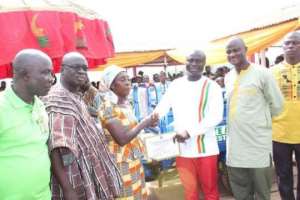
The state of poor infrastructure in rural communities continue to hinder the progress of access to education.
It would serve Ghana a lot of good if the lack of infrastructure in the educational sector is addresed.
It is in this direction that Madam Beatrice Afrakoma, a 63-year-old cocoa farmer in Akrokyere in the Sekyere Kumawu District, is calling on the government to prioritize the improvement of educational infrastructure in rural communities, to help promote quality education for rural children.
She said it was sad that children of farmers, who were toiling in remote rural communities to feed the nation, contribute significantly to the Gross Domestic product (GDP), were discriminated and denied quality education.
It was therefore the time for the government to take a second look at widening gap in educational infrastructural development in urban and rural communities and make conscious and deliberate efforts to improve classroom blocks, laboratories, libraries, teaching and learning materials as well as accommodation for teachers at the basic school level in rural communities.
Madam Afrakoma, who won the 2018 District Best Cocoa Farmer award, made the appeal through the Ghana News Agency, after receiving her award at a durbar to mark this year's farmers' celebrations at Kumawu.
She explained that, most farmers lived in villages and remote cottages with their children did not have access to quality education, especially at the basic levels.
Madam Afrakoma pointed out that deplorable road networks, coupled with bad classroom infrastructure and lack of adequate teaching and learning materials as well as qualified teachers, have conspired to deny the rural child his fair share of education.
This had made most children in rural communities unable to further in their education, hence, their inability to uplift themselves from the poverty cycle.
Madam Afrakoma urged the government to take a serious view of the contribution of farmers and take pragmatic steps to provide socio-economic infrastructure to open up rural communities to improve the living conditions of the people, especially children and women.
She said it was not enough for farmers to be celebrated on a day with awards that go to benefit a few of them.
There should deliberate efforts to ensure equity and fairness in the sharing of national resources for the benefit of all.
---GNA




 We’ll protect state wealth from opaque deals – Prof Jane Naana
We’ll protect state wealth from opaque deals – Prof Jane Naana
 Mauritania president says running for second term in June polls
Mauritania president says running for second term in June polls
 I won't ever say I was a mere driver’s mate' — Prof. Opoku-Agyemang
I won't ever say I was a mere driver’s mate' — Prof. Opoku-Agyemang
 2024 polls: 'EC struggling to defend credibility'— Prof. Opoku-Agyemang
2024 polls: 'EC struggling to defend credibility'— Prof. Opoku-Agyemang
 Akufo-Addo gov't's 'greed, unbridled arrogance, unrestrained impunity, sheer dis...
Akufo-Addo gov't's 'greed, unbridled arrogance, unrestrained impunity, sheer dis...
 Election 2024: Ghana needs an urgent reset, a leadership that is inspiring – Ma...
Election 2024: Ghana needs an urgent reset, a leadership that is inspiring – Ma...
 Partner NDC to rollout a future of limitless prospects – Prof Jane Naana Opoku-A...
Partner NDC to rollout a future of limitless prospects – Prof Jane Naana Opoku-A...
 NPP will remain in gov’t till Jesus comes — Diana Asamoah
NPP will remain in gov’t till Jesus comes — Diana Asamoah
 Sunyani Technical University demands apology from former SRC president over sex-...
Sunyani Technical University demands apology from former SRC president over sex-...
 'Dumsor' was resolved by Mahama but ‘incompetent' Akufo-Addo has destroyed the g...
'Dumsor' was resolved by Mahama but ‘incompetent' Akufo-Addo has destroyed the g...
